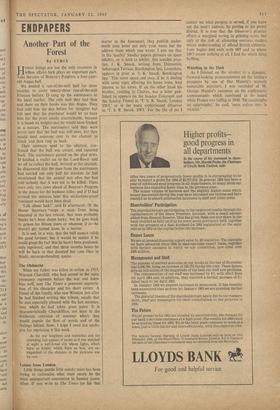ENDPAPERS
Another Part of the Forest
By STR1X HUMAN beings are not the only creatures in wItose affairs luck plays an important part. Take the case of Benyon's Progress, a four-year- old Angus bull.
We needed a run-of-the-mill bull for three months, to cover twenty-three run-of-the-mill Friesian heifers. D rang up the auctioneers at the local market. The only bull they had then and there on their books was this Angus. They had sold him the day before for slaughter but felt sure that the purchaser would let us have him for the price (easily ascertainable, because it is based on weight) that he would have fetched as a carcass. The auctioneers said they were pretty sure that the bull was still alive, but they would send someone over to the abattoir to check and then ring us back.
Their emissary sped to the abattoir, con- firmed that the bull was extant, and reported back. The auctioneers passed on the glad news. 13 hitched a trailer on to the Land-Rover and set off to collect the bull. Arrived at the abattoir, he discovered that the man from the auctioneers had carried out only half his mission; he had ascertained that the animal was alive but had told nobody that it was not to be killed. There were only two cows ahead of Benyon's Progress in the queue for the humane killer, and if D had arrived ten minutes later this misfortune-proof ruminant would have been dead.
'Talk about luck!' said D afterwards. if the Home Secretary 'stops a man from being executed at the last minute, that man probably thinks he's been damn lucky, but he goes back to prison for fifteen years or whatever it is--he doesn't get turned loose in a harem.
It is sad, in a way, that the bull cannot relish his good fortune; but it would be sadder if he could grasp the fact that he hasn't been pardoned, only reprieved, and that three months hence he will be back in that doomed but (one likes to think) uncomprehending queue.
The Obituarist
When my father was killed in action in 1917, Winston Churchill, who had served in the same yeomanry regiment before the war and knew him well, sent The Times a generous apprecia- tion of his character and his short career. A friend of the family, who saw Winston just after he had finished writing this tribute, recalls that he was especially pleased with the last sentence, over which he had taken great pains. It is characteristically Churchillian, not least in the deliberate omission of commas where they would impede the flow of words and of the feelings behind them; I hopel need not apolo- gise for reprinting it this week.
As the war lengthens and intensifies and the extending lists appear, it seems as if one watched at night a well-loved city whose lights, which burn so bright, which burn so true, are ex- tinguished in the distance in the darkness one by one.
Letters from London
Little things puzzle little minds; mine has been trying to rationalise what must surely be the most unimportant convention in Sunday journ- alism. If you write to The Times (or for that matter to the Spectator), they publish under- neath your letter not only your name but the address from which you wrote. 1 can see that in the 'quality' Sunday papers pressure on space inhibits, or is held to inhibit, this sensible prac- tice. J. K. Snook, writing from Dunromin, Sebastopol Terrace. Beechington Spa, Loamshire, appears in print as 'J. K. Snook. Beechington Spa.' This saves space and may, if he is dealing with some topic affecting his home town, lend interest to his views. If on the other hand his brother, residing in Chelsea, has a letter pub- lished he appears (in the Sunday Telegraph and the Sunday Times) as 'T. S. R. Snook. London SW3,' or in the more sophisticated Observer as 'T. S. R. Snook. SW3.' For the life of me I cannot see what purpose is served, if you leave out the man's address, by putting in his postal district. It is true that the Observer's practice effects a marginal saving in printing costs, but only at the risk of alienating overseas readers whose understanding of official British abbrevia- tions begins and ends with 007 and to whom SW3 means nothing at all. I find the whole thing bafflina.
Whistling in the Dark
As I listened on the wireless to a dynamic, forward-looking pronouncement on the nation's prospects by one of Her Majesty's scarcely numerable ministers, I was reminded of M. George Mandel's comment on the euphemistic communiquds which continued to be issued while France was falling in 1940. 'De catastrophe en catastrophe,' he said, 'nous voknis vers la victoire.'






































 Previous page
Previous page